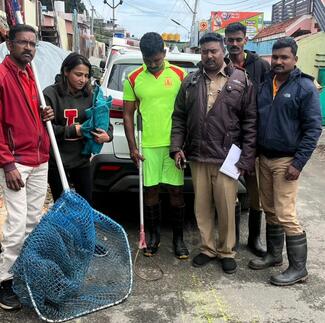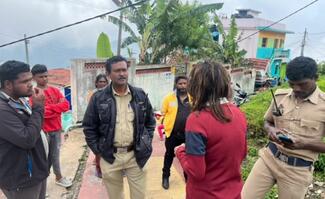
Your Work
Where do you work?
KSPCA
When did you start your work?
2015
What rabies elimination work do you do?
Rabies Control and Animal Health Report: Kodai Hills
Introduction
This report outlines the significant strides made in controlling rabies and enhancing animal health in Kodai Hills. Through a combination of vaccination programs, Animal Birth Control (ABC) efforts, equine health initiatives, and community education, we have worked diligently to maintain a rabies-free status and foster responsible pet ownership.
Rabies Containment
Our sustained efforts have led to a successful rabies containment for the past 7 years. This achievement reflects our ongoing commitment to animal health and community safety.
Vaccination and ABC Programs
2017:
Conducted 501 ABC/ARV procedures.
Vaccinated more than 1,000 animals.
2019-2020:
Administered 498 ABC/ARV procedures.
Vaccinated more than 1,200 animals.
2019-2020 in Dindigul Town:
Performed 1,202 ABC/ARV procedures on dogs.
Vaccinated more than 3,000 animals.
2024:
Executed a mass ARV campaign across Kodai Hills.
Successfully vaccinated 3,751 dogs and cats ( in 5 days)
Equine Health
Conducted biannual equine camps for regular tetanus vaccinations.
Provided vaccinations to over 150 working equines twice a year.
Community Education and Outreach
Schools and Colleges:
Regular visits to educational institutions to educate students about rabies prevention and responsible pet ownership.
Villages:
Outreach programs aimed at raising awareness about rabies and promoting responsible pet care.
Conclusion
The comprehensive approach adopted in Kodai Hills, integrating medical intervention with community education, has significantly contributed to maintaining a rabies-free environment and improving animal health. The combined efforts in vaccination, ABC programs, equine health initiatives, and proactive educational outreach underscore our commitment to a safer and healthier community.
Your Work in Numbers
Number of animals vaccinated against rabies (last year) 3751
Number of animals sterilized (last year) 441
Number of children educated (last year) 6721
Number of adults educated (last year) 5234
Number of Professionals trained (last year) 21
Number (Other) last year: 52
Your Work's Impact
Impact on the Community
Our comprehensive efforts in rabies control and animal health have had a profound and positive impact on the community in Kodai Hills. The key areas of impact are as follows:
Improved Public Health:
Rabies Prevention: By maintaining a rabies-free status, we have significantly reduced the risk of rabies transmission to humans. The high vaccination coverage for both dogs and cats has contributed to a safer environment for residents and minimized potential health hazards associated with rabies.
Increased Awareness: The educational programs conducted in schools and colleges have increased awareness about rabies prevention among students. This knowledge is critical in fostering a culture of safety and responsibility from a young age.
Enhanced Animal Welfare:
Reduced Animal Suffering: The consistent application of Animal Birth Control (ABC) and Anti-Rabies Vaccination (ARV) has not only controlled the stray animal population but also improved the overall health and well-being of animals. By addressing these issues, we have alleviated the suffering of numerous animals and provided them with a healthier living environment.
Equine Health: Regular tetanus vaccinations for working equines have ensured that these animals remain healthy and productive, directly benefiting the livelihoods of their owners and improving the quality of work-life for these animals.
Community Engagement and Responsibility:
Responsible Pet Ownership: Our outreach programs have educated pet owners about the importance of responsible pet care, including regular vaccinations and proper management. This has led to improved pet care practices and a stronger sense of community responsibility.
Empowered Communities: By actively engaging with local residents, schools, and villages, we have empowered individuals with the knowledge and resources needed to contribute to a healthier community. This collaborative approach has fostered a sense of shared responsibility and commitment to animal welfare.
Strengthened Community Relations:
Collaborative Efforts: The partnerships formed with local authorities, NGO partners, schools, and community organizations have strengthened relationships and facilitated a collective effort toward common goals. This collaborative spirit has enhanced community support for our initiatives and contributed to their overall success.
In summary, the impact of our work extends beyond the immediate health benefits to create a more informed, responsible, and engaged community. The positive outcomes of our efforts are evident in the improved health of animals, increased public safety, and heightened community awareness and involvement.
Partners
Government partners
Kodaikanal muncipality
dindigul corporation
Tamilnadu forest department
Animal husbandry department
revenue department
public health centre
Government collaboration:
10 years
NGO Partners
Mission Rabies India
Worldwide Veterinary Service
Humane Society International India
Humane Animal Society Coimbatore
Charlies Animal Rescue Centre Bangalore
Hope Animal Organisation
NGO collaboration:
10 years
Other partners
1.LYKA PET CLINIC 2.SCOOBYS CAFE 3.KODAIKANAL INTERNATIONAL SCHOOL 4.KODAIKANAL CHRISTIAN COLLEGE 5.KODAI CHEESE 6.THE ANNAMALAIS GROUP
Other collaboration:
10 Years
Innovations and Learnings
What is innovative about your approach?
Innovative Approach and Technology Integration
Our approach to rabies control and animal health is distinguished by several innovative practices and the integration of advanced technology, which collectively enhance the effectiveness and efficiency of our programs. Key aspects of our innovative approach include:
Comprehensive and Sustainable Strategies:
Integrated Programs: We have developed a holistic strategy that combines Animal Birth Control (ABC) and Anti-Rabies Vaccination (ARV) with regular equine health camps. This integrated approach ensures a thorough and sustainable solution to controlling both stray animal populations and preventing rabies.
Mass Vaccination Campaigns: Our targeted mass vaccination campaigns, such as the recent one covering the entire Kodai Hills, demonstrate a proactive and large-scale approach to public health. This method ensures extensive coverage and minimizes the risk of disease outbreaks.
Community-Centric Education:
Proactive Outreach: We prioritize community engagement by visiting schools, colleges, and villages to educate residents about rabies prevention and responsible pet ownership. This grassroots approach fosters a deeper understanding and commitment to animal health and safety within the community.
Technological Integration:
Advanced Data Collection: We utilize a specialized app for managing vaccination and sterilization efforts. This app is a crucial tool in our operations, allowing for:
Intensive Data Collection: The app provides detailed records of each vaccination and sterilization procedure, including animal identification, vaccination status, and follow-up information. This comprehensive data collection ensures accuracy and facilitates monitoring of individual animal health and program effectiveness.
Real-Time Tracking: The app enables real-time tracking of vaccination and sterilization activities, improving coordination and resource allocation. This ensures that no animal is overlooked and that follow-up procedures are timely and efficient.
Data Analysis and Reporting: The collected data is analyzed to identify trends, assess program impact, and make informed decisions. This data-driven approach enhances our ability to adapt and improve our strategies based on empirical evidence.
Innovative Community Engagement:
Educational Technology: Incorporating digital tools and multimedia resources in our educational programs helps engage and inform audiences more effectively. This innovation supports better understanding and retention of important information about rabies and pet care.
In summary, our innovative approach combines comprehensive program strategies with advanced technological tools to enhance our rabies control and animal health efforts. The use of a specialized app for data collection and real-time tracking significantly improves the efficiency and effectiveness of our programs, while our community-centric education initiatives foster a culture of responsibility and awareness.
Lessons learned (Positive)
Our extensive work in rabies control and animal health in Kodai Hills has yielded several valuable lessons that highlight the effectiveness of our strategies and the importance of continuous improvement.
The Power of Integrated Approaches:
Holistic Solutions Work: Combining Animal Birth Control (ABC) with Anti-Rabies Vaccination (ARV) and equine health programs has proven to be highly effective.
Community Engagement is Key:
Local Involvement:
Empowerment Through Education: T
The Value of Data-Driven Decisions:
Enhanced Efficiency:
Continuous Improvement: This data-driven approach has been crucial in refining our methods and ensuring ongoing success.
Proactive Campaigns Yield Significant Results:
Large-Scale Impact: Conducting mass vaccination campaigns and targeted outreach efforts have shown that proactive measures
The Importance of Collaboration:
Partnerships and Support: Collaborating with local authorities, NGO, community organizations, and residents has been essential in achieving our goals.
Shared Responsibility:
Adaptability and Flexibility:
Responsive Strategies:
In conclusion, the positive lessons learned from our work in Kodai Hills underscore the importance of a comprehensive, community-centered, and data-driven approach to animal health and disease prevention. These insights not only highlight the success of our current efforts but also provide a foundation for continued improvement and future initiatives.
Lessons learned (Negative)
While our efforts in rabies control and animal health have achieved considerable success, several challenges have emerged that highlight areas for improvement. Understanding these challenges is crucial for refining our approach and enhancing future programs:
Skepticism Toward Vaccinations:
Public Doubts:
Community Resistance:
Cultural Beliefs:
Education Gaps:
Resource Limitations:
Funding Constraints: Limited financial resources have occasionally constrained our ability to expand operations, invest in advanced technology, or conduct additional outreach activities. This has impacted the scope and scale of our programs and highlights the need for sustainable funding sources.
Staffing Challenges: Adequate staffing and training are critical for the successful implementation of our programs. Challenges in recruiting and retaining qualified personnel have affected our operational capacity and efficiency, necessitating improved recruitment and training strategies.
Operational Difficulties:
Logistical Issues:
Follow-Up Complications:
Unanticipated Public Health Risks:
Emerging Health Threats:
Sustainability Issues:
Long-Term Engagement:
In summary, while significant progress has been made, challenges related to skepticism toward vaccinations, community resistance, resource limitations, operational difficulties, and public health risks highlight areas for improvement. Addressing these issues will help refine our strategies, enhance program effectiveness, and achieve our goals more effectively.
** All information adapted from the submitted nomination form**



